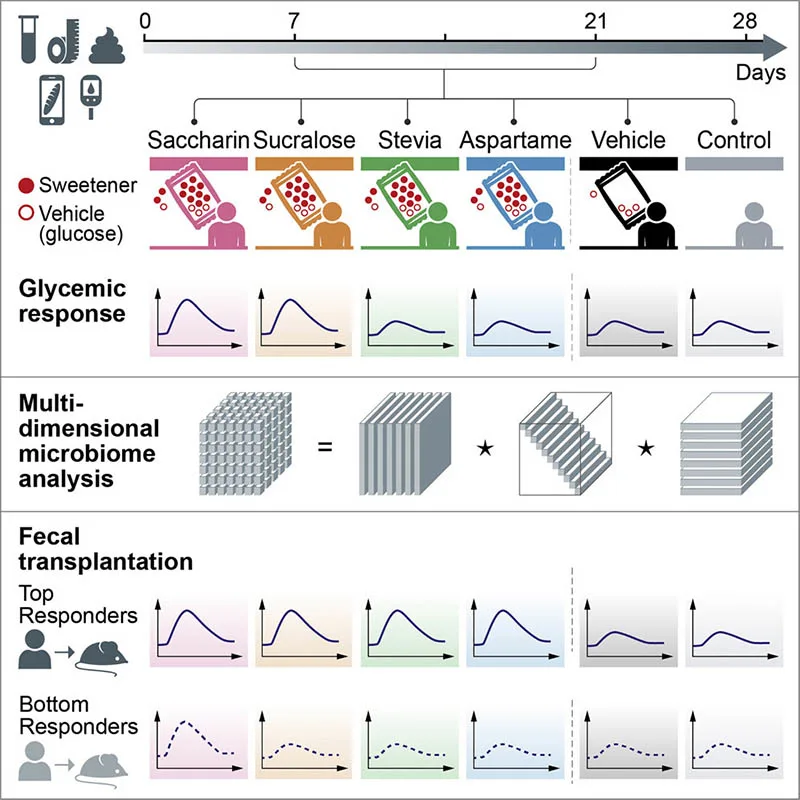Artificial sweeteners can affect your gut bacteria, researchers find
17 January 2023
By Kelcie Walther

Non-nutritive sweeteners affect human microbiomes and can alter glycemic responses, researchers find; read their study in Cell
For many of us, New Year’s resolutions focus on healthier living, and that often involves reducing sugar intake. For those of us who crave a dash of sweetness without all the sugar, it’s easy to reach for the brightly colored packets and choose products with sugar substitutes.
Since the late 1800s, non-nutritive sweeteners have promised to deliver all the sweetness of sugar with none of the calories. These sugar replacements have long been believed to have no significant effect on the human body. However, researchers publishing in the journal Cell challenged this notion. They found that some sugar substitutes can alter human microbiomes in a way that can change blood sugar levels.
In 2014, senior author Prof Eran Elinav opens in new tab/window, an immunologist and microbiome researcher at the Weizmann Institute of Science opens in new tab/window and the German Cancer Research Center (DKFZ) opens in new tab/window, and his team found that non-nutritive sweeteners affected the microbiomes of mice in ways that could impact their glycemic responses. The team was interested in whether these results would also be found in humans.
To address this important question, the research team carefully screened over 1,300 individuals for those who strictly avoided non-nutritive sweeteners in their day-to-day lives and identified a cohort of 120 individuals. These participants were broken into six groups: two controls and four who ingested well below the FDA daily allowances of either aspartame, saccharin, stevia, or sucralose.

Prof Eran Elinav, Ph.D
Prof Elinav reported:
In subjects consuming the non-nutritive sweeteners, we could identify very distinct changes in the composition and function of gut microbes and the molecules they secrete into peripheral blood. This seemed to suggest that gut microbes in the human body are rather responsive to each of these sweeteners. When we looked at consumers of non-nutritive sweeteners as groups, we found that two of the non-nutritive sweeteners, saccharin and sucralose, significantly impacted glucose tolerance in healthy adults. Interestingly, changes in the microbes were highly correlated with the alterations noted in people’s glycemic responses.

Non-nutritive sweeteners affect human microbiomes and can alter glycemic responses (Credit: Cell/Suez et al)
To establish causation, the researchers transferred microbial samples from the study subjects to germ-free mice — mice that have been raised in completely sterile conditions and have no microbiome of their own.
“The results were quite striking,” Prof Elinav said. “In all of the non-nutritive sweetener groups, but in none of the controls, when we transferred into these sterile mice the microbiome of the top responder individuals collected at a time point in which they were consuming the respective non-nutritive sweeteners, the recipient mice developed glycemic alterations that very significantly mirrored those of the donor individuals.
“In contrast, the bottom responders’ microbiomes were mostly unable to elicit such glycemic responses,” he added. “These results suggest that the microbiome changes in response to human consumption of non-nutritive sweetener may, at times, induce glycemic changes in consumers in a highly personalized manner.”
Prof Elinav said that he expects that the effects of the sweeteners will vary person to person because of the incredibly unique composition of our microbiome:
We need to raise awareness of the fact that non-nutritive sweeteners are not inert to the human body as we originally believed. With that said, the clinical health implications of the changes they may elicit in humans remain unknown and merit future long-term studies. In the meantime, we need to continue searching for solutions to our sweet tooth craving, while avoiding sugar, which is clearly most harmful to our metabolic health. In my personal view, drinking only water seems to be the best solution.
Read the article in Cell
Suez et al: Personalized microbiome-driven effects of non-nutritive sweeteners on human glucose tolerance opens in new tab/window, Cell (August 2022)
Cell opens in new tab/window, the flagship journal of Cell Press, is a bimonthly journal that publishes findings of unusual significance in any area of experimental biology, including cell biology, molecular biology, neuroscience, immunology, virology and microbiology, cancer, human genetics, systems biology, signaling, and disease mechanisms and therapeutics.
Contributor

KW